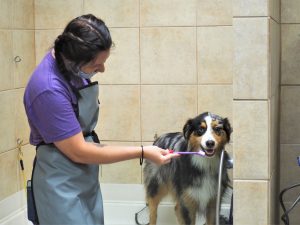In honor of  Pet Dental Awareness Month, we’re highlighting the importance of a dental hygiene routine for your dog. The majority of dogs show signs of periodontal disease as early as three, so it’s important to get started when they are young.
Pet Dental Awareness Month, we’re highlighting the importance of a dental hygiene routine for your dog. The majority of dogs show signs of periodontal disease as early as three, so it’s important to get started when they are young.
 Pet Dental Awareness Month, we’re highlighting the importance of a dental hygiene routine for your dog. The majority of dogs show signs of periodontal disease as early as three, so it’s important to get started when they are young.
Pet Dental Awareness Month, we’re highlighting the importance of a dental hygiene routine for your dog. The majority of dogs show signs of periodontal disease as early as three, so it’s important to get started when they are young.Too much plaque and tartar build up causes bacteria to develop and can inflame the dog’s gums, develop cavities, infection, tissue and tooth loss. Left untreated, unhealthy teeth and gums can lead to life-threatening health problems over time.
- The best line of defense is to brush your dog’s teeth weekly with a dog specific toothpaste containing enzymes such as Virbac C.E.T. and Nylabone Advanced Oral Care. Flavored toothpastes can help turn the experience into, if not a treat, at least something your dog doesn’t run away from. We know this can be a tricky task for some, so we offer teeth brushing in our spa, where our staff can take care of it for you.
- Dental treats & chew toys are great additions to your pet’s hygiene routine. These clean the teeth, remove plaque, and freshen the breath!
- You can also ask your vet to clean your dog’s teeth if there is build up already. This procedure requires sedation, which carries its own risks and costs, so the goal is to keep their teeth clean so you don’t need to use this option. If you do go this route, remember to begin a weekly teeth brushing regimen immediately afterward.
Although it’s common, bad breath isn’t just an unpleasant experience for you—it can be an indication of health issues for your dog. If your dog’s breath is consistently bad after your teeth brushing efforts, and is accompanied by other symptoms like loss of appetite, vomiting, or excessive drooling and drinking, contact your vet to get further help.

